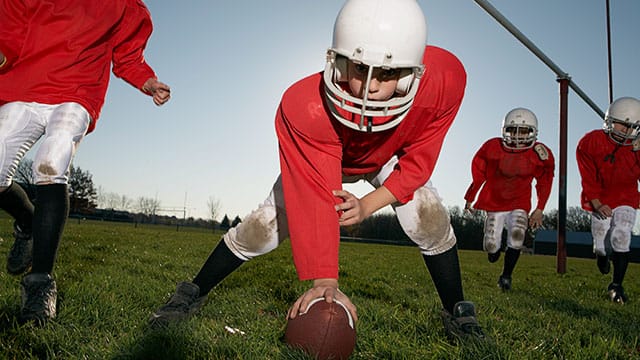Do You Need a Mouthguard?
Mouthguards are an excellent preventive tool for many types of situations that cause harm or injury to your teeth and gums. Even though our enamel, the outermost layer of our teeth, is stronger than bone, damage can occur in several ways. Your dental professional may recommend a mouthguard if you have specific sleep issues or grind your teeth, play sports, or suffer from TMD problems.
Types of Mouthguards
Mouthguards for Grinding
Who hasn't woken up from a bad dream or a poor night's sleep to discover their jaw feels a little sore? When this becomes a regular occurrence, it may be time to speak with a dental professional about a nightguard. Your dental professional may even notice your enamel showing signs of wear or see chips and cracks in your fillings. These are typically the first signs that you grind or clench your teeth at night.
Grinding or clenching, also known as bruxism, is often caused by stress, sleep disorders, a misaligned bite, acid reflux, or some medication side effect. Smoking and drinking alcohol or caffeine beverages also increase the likelihood of grinding. While it can be challenging to diagnose the exact reason for grinding or clenching your teeth at night (who doesn't experience stress?), addressing the habit early on is vital. Long-term teeth grinding left untreated can wear your enamel down to your teeth' second layer, the softer dentin material.
Repairing broken fillings and making any necessary bite adjustments is the first step to treating grinding or clenching. After that, a dentist-recommended mouthguard (sometimes referred to as a nightguard or splint) can be helpful to wear while you sleep. It acts as a barrier between your teeth, so your enamel doesn't wear down as you grind. Furthermore, it can even help you break the grinding habit itself!
Mouthguards for TMD Problems
If you've ever experienced consistent jaw discomfort while chewing or noticed a loss of mobility when trying to open your mouth, you're not alone. The National Institute of Dental and Craniofacial Research estimates that over 10 million Americans have temporomandibular joint (TMJ) problems. Popping or clicking sounds accompanied by pain or dull headaches are also symptoms associated with a TMJ complication. While there's no way to know your TMJ disorder's exact cause, it usually stems from arthritis, genetics, or jaw injuries.
The first line of treatment is wearing a custom-made mouthguard or splint at night. This allows your jaw muscles to recover while you sleep and protects your teeth from wearing down. Because of TMJ complexity, splints are always custom-made by the dental professional who is treating the problem.
Mouthguards for Sports
Whether you're a weekend soccer player or your child just joined a hockey team, protecting your family's teeth from injury should be a top priority. Most mouth-related sports injuries involve broken or chipped teeth (most often the central incisors), fractured tooth roots, and cuts to the lips and tissue inside of the mouth. But did you know that the risk of a sports injury is significantly reduced when wearing a well-fitting mouthguard? A study published in the International Journal of Environmental Research and Public Health found that college students who wore mouthguards while playing sports were less likely to experience a sports-related concussion.
The soft absorbing material that makes up mouthguards helps cushion a blow to your teeth. If you have braces, you're especially vulnerable to a sports-related issue. Soft tissue injuries from your braces coming in contact with your mouth tissue are reason enough to wear a mouthguard made to fit over your braces. And you don't want to run the risk of damaging your braces either, which would require attention from your dental professional.
Always check with a coach or league referee to determine their mouthguard requirements before making your dental appointment. Sports mouthguards are often replaced more than others due to your child's mouth still growing and the mouthguard's natural wear and tear over a sports season. And don't forget to bring your mouthguard along for your six-month dental checkup. You'll be ahead of the game by taking this preventative measure of having a professional confirm it still fits!
Mouthguards for Sleep Disorders
It may seem strange that adding more things inside your mouth could help with sleep disorders such as obstructive sleep apnea. But incorporating a mandibular advancement device into your nightly routine can be a beneficial tool for getting a better night's sleep. By wearing this mouthguard on the lower arch, the tongue and jaw reposition to keep the airway open. People who snore loudly or have nighttime bruxism may also find that this device helps ease their symptoms.
Choosing a Mouth Guard
Whatever diagnosis you've received for your mouth, a guard that fits well and is comfortable, durable, and resistant to tearing will hopefully relieve any painful symptoms. There are three types of mouthguards to consider:
- You can find an inexpensive stock mouthguard online or at a drugstore. These guards' sizes are usually limited to small, medium, and large, so getting a good fit is a challenge. You may also find that they are uncomfortable and bulky or that even a properly fitted one can impede your breathing and speaking.
- A boil-and-bite mouthguard can be found online, at drugstores, and sporting goods stores. For this type of mouthguard, the fitting is up to you! You'll boil it in hot water and bite into it while warm to get a customized fit. This personalized fit is better than a stock mouthguard, but make sure to follow those directions.
- The most comfortable and effective type of teeth protection is custom-made mouthguards by a dental professional. They can be expensive, but your dentist or dental insurance may provide some coverage to help with the cost.
How Your Dentist Makes a Mouthguard
A custom-made mouthguard usually involves two appointments with your dental professional. They'll take impressions of your teeth and make a model, sending it to a laboratory where the mouthguard is fabricated for a custom fit. After your mouthguard comes back from the lab, your second appointment is to confirm it fits. Finally, your dental professional will file down any rough edges and make any necessary adjustments for that perfect shape and size, unique to you!
Sleeping With a Mouthguard
At this point, you may have a concern about the distraction of sleeping with plastic in your mouth. Who wouldn't? Like anything new, it's a lesson in patience! To make wearing your mouthguard a nightly habit, you need to wear it consistently for at least a month. If you've tried wearing your mouthguard, but it's just too uncomfortable or doesn't fit correctly, don't be shy about letting your dental professional know. They can check the problem, fix it, and help you get back on the road to regular wear.
Caring for Your Mouthguard
Just like you clean your teeth every day to remove bacteria, it should be no surprise that you'll need to clean and sanitize your mouthguard after wearing it. It would help if you brushed your guard with a toothbrush and toothpaste after wearing it. Rinse it well, and take time once every week or two to soak it in an antimicrobial solution, such as diluted mouthwash or denture cleaner. Make sure it's dry and store it in a ventilated case. Look for any cracks or rough edges so you won't have a mouthguard that irritates your gums or stores bacteria.
Before you decide whether a mouthguard is the answer to your particular dental problem, be sure to consult a professional. We all hope that brushing and interdental cleaning our teeth every day is enough to keep our mouths healthy. But unexpected, yet common issues like TMD, sleep apnea, and bruxism often come into play. And since you're already so dedicated to your oral health, you know that prevention is the key. Making the commitment and conscious effort to wear your mouthguard regularly will be crucial to keeping your enamel strong and your smile confident!
This article is intended to promote understanding of and knowledge about general oral health topics. It is not intended to be a substitute for professional advice, diagnosis or treatment. Always seek the advice of your dentist or other qualified healthcare provider with any questions you may have regarding a medical condition or treatment.
ORAL HEALTH QUIZ
What's behind your smile?
Take our Oral Health assessment to get the most from your oral care routine
ORAL HEALTH QUIZ
What's behind your smile?
Take our Oral Health assessment to get the most from your oral care routine















